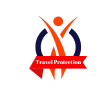Introduction
Traveling abroad for work is an exciting opportunity, but it also comes with a unique set of challenges. Whether you’re embarking on a short-term assignment or relocating for a long-term project, ensuring that you are adequately protected during your stay is critical. Travel protection goes beyond basic insurance; it includes taking proactive measures to safeguard your health, personal security, and legal well-being while working in foreign markets. This article will provide you with essential tips to protect yourself while working internationally.

1. Secure Comprehensive Travel Insurance
When working abroad, travel insurance is your first line of defense against unforeseen events. Whether you’re traveling for business meetings or an extended overseas assignment, make sure your insurance coverage is robust and includes medical protection, trip interruption, lost baggage, and other unexpected circumstances.
Opt for a plan that covers emergency medical evacuation, which is essential if you’re working in a location where local healthcare facilities may not be equipped to handle serious health issues. Additionally, choose a plan that includes trip cancellation coverage to protect your investment if you need to cut your travel short due to illness, political unrest, or other emergencies.
2. Be Aware of Local Laws and Regulations
Every country has its own legal framework, which is vital to understand before arriving. Familiarizing yourself with local laws and regulations can prevent costly mistakes and ensure that you stay within the boundaries of what’s legally acceptable. For instance, countries may have different tax codes, labor laws, and work permit requirements, all of which are crucial when managing your international employment.
You should also be aware of specific regulations that might affect your personal security, such as travel advisories or restrictions on where foreigners can live or work. If needed, consult with a local legal expert or the embassy to understand your rights and obligations while abroad.
3. Prioritize Health Protection and Medical Coverage
One of the most important aspects of travel protection is your health. Ensure you have overseas health insurance that will provide coverage for both routine healthcare and emergency situations. This includes coverage for medical evacuation, which could be necessary if you’re in a remote area or in a country with limited healthcare infrastructure.
Be sure to check for vaccination requirements specific to the country you will be working in and have any necessary shots or medications before your departure. Also, carry a list of essential medications, as certain drugs may not be available abroad. Travel health apps can help you track potential health risks and offer advice on staying safe while abroad.
4. Stay Informed About Local Safety Risks
Understanding the safety landscape of the region where you’re working is crucial. Research potential security risks, such as areas with high crime rates, political instability, or natural disasters. Your company or local embassy may provide valuable insights or travel advisories for your destination.
Make sure you know how to reach emergency services, including the local police, hospitals, and embassies, should you need immediate assistance. Stay connected with local colleagues, as they can often provide up-to-date information about the safety situation on the ground.
5. Keep Your Travel Documentation in Order
Before traveling, make sure that all necessary travel documents are in place. This includes ensuring that your passport is valid for at least six months beyond your travel dates and obtaining any required visas or work permits. Additionally, make multiple copies of your important documents and store them securely in case your originals are lost or stolen.
Registering with your embassy can also be a useful precaution. It makes it easier for local authorities or your government to assist you in case of an emergency.
6. Gain Cultural Awareness and Respect Local Etiquette
Understanding the local culture and etiquette will go a long way in helping you build strong professional relationships and avoid misunderstandings. Each country has its own set of social norms, so taking the time to familiarize yourself with local customs can improve your overall experience. This includes things like business attire, greeting practices, and communication styles.
Being respectful of these differences will not only help you navigate business environments more smoothly but also improve your relationships with your colleagues and clients abroad.
7. Leverage Technology for Communication and Security
Staying connected while working abroad is essential, but it’s equally important to ensure that your communication is secure. Use trusted communication tools and apps to stay in touch with your team and loved ones. For added security, consider using a VPN (Virtual Private Network) to protect your personal and work-related data when accessing public Wi-Fi networks.
Location-based services and secure messaging apps can help you stay in touch while keeping your communications private. Additionally, consider downloading apps that provide real-time updates on local security conditions and emergency contacts in your area.
8. Choose Safe Accommodations
When selecting where to stay, make sure your accommodation is secure and well-located. Choose properties with on-site security and well-maintained emergency exits. Research hotels, serviced apartments, or Airbnb options and read reviews to ensure the place has a strong reputation for safety.
In addition to physical security, check for other amenities that could contribute to your well-being, such as healthcare proximity and access to reliable transportation.
9. Be Prepared with Emergency Plans
In case of emergencies, having a solid contingency plan is crucial. Familiarize yourself with local emergency services, including hospitals, police stations, and fire departments. Also, ensure that you have a list of important contacts, such as your embassy, your company’s HR department, and local emergency services.
Having a travel safety app that tracks your movements and offers emergency alerts can also be a useful tool in ensuring your safety in case of unforeseen circumstances.
10. Implement Risk Management Strategies
Assessing risks before and during your assignment will help mitigate potential issues that could arise. Identify any potential hazards such as political unrest, natural disasters, or health concerns that may affect your travel and work. Implementing a risk management plan can help you make informed decisions and take proactive steps to minimize any disruptions or dangers.
By leveraging risk management tools or consulting with professionals, you can anticipate potential challenges and develop strategies to address them efficiently.
Conclusion
Working in foreign markets offers incredible professional opportunities, but it also comes with significant responsibilities. Travel protection is essential to ensure that you stay safe, healthy, and legally compliant while navigating international work environments. By securing comprehensive insurance, understanding local laws, staying informed about safety risks, and prioritizing health, you can enjoy a smooth and successful international assignment. With the right preparation, you can turn your global work experience into a rewarding journey both personally and professionally.
